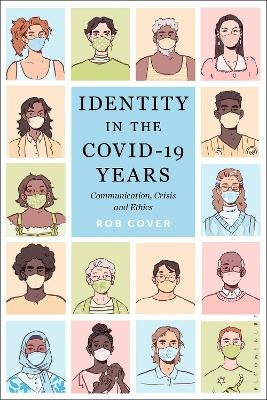
Identity in the COVID-19 Years
Bloomsbury Academic USA (Verlag)
978-1-5013-9367-9 (ISBN)
This book explores how the COVID-19 pandemic has had a significant impact on how we perform our identities, engage in social belonging, and communicate with each other. Understanding the onset of the pandemic as a moment experienced as cultural rupture, Cover provides a framework for understanding how selfhood, belonging, relationships and perceptions of time and space have undergone a disruption that not only is damaging to continuity and stability but also provides positive value through renewal and the re-making of the self and ways of living ethically.
Drawing on philosophic, media and cultural studies approaches, this book describes how networks of mutual care and global interdependency have been powerfully drawn out by the experience of the pandemic, yet also disavowed in some settings in favour of a problem individualism and sustained inequalities.
The roles of disruption and interdependency are examined across an array of pandemic-related topics, including health communication, apocalyptic storytelling, lockdowns and immobilities, mask-wearing, social distancing and new practices touch, anti-vaccination discourses, and frameworks for mourning the lost past and the uncertain future. By focusing on the impact of the pandemic on identity, this work explains and revisits theories of belonging and ethics to help us understand how new ways of perceiving our vulnerability may lead to more positive, inclusive and ethical ways of living.
Rob Cover is Professor of Digital Communication at RMIT University, Melbourne, Australia. He leads a number of major funded research projects on young people, health and wellbeing and digital and broadcast media, publishing widely on topics related to digital cultures in the context of social identities, young people, suicide prevention and resilience. He is the author of Queer Youth Suicide, Culture and Identity: Unliveable Lives? (2012), Vulnerability and Exposure: Footballer Scandals, Masculinity and Ethics (2015), Digital Identities: Creating and Communicating the Online Self (2016) and Emergent Identities: New Sexualities, Gender and Relationships in a Digital Era (2019), Flirting in the Era of #MeToo: Negotiating Intimacies (with A Bartlett and K Clarke;2019), and Population, Mobility and Belonging: Understanding Population Concepts in Media, Culture and Society (2020).
Acknowledgements
Introduction: Stories of Rupture and Resilience in a Pandemic
1 Media Discourses of Coronavirus: From Health Advisory to Conspiracy
2 Apocalyptic Fictions as a Roadmap for Crisis
3 Disrupted Identity: The Self in a Time of Radical Cultural Change, Anxiety, and Crisis
4 Disrupted Mobility: Lockdowns, Borders, and Movement
5 Disrupted Exposure: Ethics and the Face of the Other in the Time of Masks
6 Disrupted Touch: Hands, Bodies, and Social Distancing
7 Disrupted Corporealities: Vaccination and Anti-vaxxers
8 Disrupted Futurity: Mourning the Self and the Other
Conclusion: COVID Futures: Ethical Care in Interdependency
References
Index
| Erscheinungsdatum | 29.11.2023 |
|---|---|
| Verlagsort | New York |
| Sprache | englisch |
| Maße | 152 x 229 mm |
| Themenwelt | Literatur |
| Sachbuch/Ratgeber ► Gesundheit / Leben / Psychologie ► Krankheiten / Heilverfahren | |
| Studium ► Querschnittsbereiche ► Infektiologie / Immunologie | |
| Sozialwissenschaften ► Kommunikation / Medien ► Kommunikationswissenschaft | |
| Sozialwissenschaften ► Kommunikation / Medien ► Medienwissenschaft | |
| ISBN-10 | 1-5013-9367-7 / 1501393677 |
| ISBN-13 | 978-1-5013-9367-9 / 9781501393679 |
| Zustand | Neuware |
| Informationen gemäß Produktsicherheitsverordnung (GPSR) | |
| Haben Sie eine Frage zum Produkt? |
aus dem Bereich


